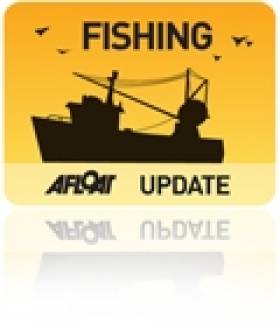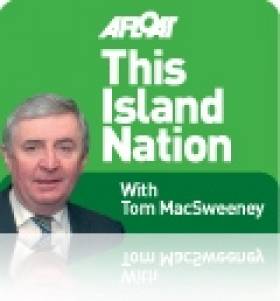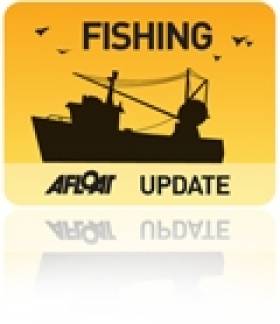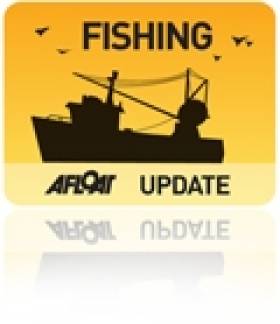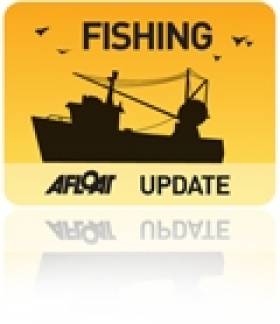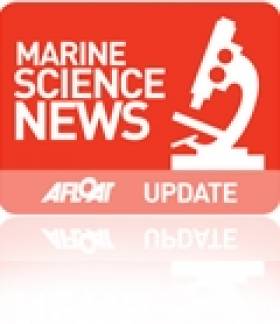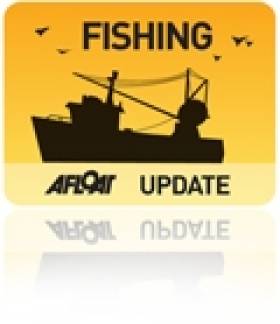Displaying items by tag: Bord Iascaigh Mhara
#FISHING - Bord Iascaigh Mhara (BIM) recently convened a Fisheries Local Action Group (FLAG) with representatuves from the fishing and tourism industries, community groups and county councils to discuss ways to boost revenue in the Galway and Clare region.
As the Galway Advertiser reports, the Western region FLAG comes after the official launch of the 'Axis 4' programme for sustainable development of fishery-dependent areas, which aims to empower communities that rely on fishing or aquaculture to further develop the marine resources at their disposal.
It also comes hot on the heels of the Government's 'ocean wealth roadmap' launched by Marine Minister Simon Coveney earlier this month, which is specifically geared towards exploiting Ireland's potential for 'blue growth'.
The six FLAGs established in key coastal areas around Ireland are responsible for formulating a development strategy for funding suitable local projects. To qualify for funding support, such projects must satisfy a list of critera, such as having a clear marine connection or providing specific benefit to a fishing area.
The Galway Advertiser has much more on the story HERE.
Valentia Radio, Coastguard Equipment & Poor Olympic Coverage
Another attempt is being made by Coast Guard management in Dublin to close the coastal radio stations at Valentia and Malin Head and centralise operations in Dublin. That, the poor quality of television coverage of sailing at the Olympics, the future of the State's national fishing board and the launch of the national maritime plan, are amongst my topics on this week's THIS ISLAND NATION.
RESPECT FOR VALENTIA RADIO
Sailing the West Cork coastline last week Valentia Radio was a welcome companion. I listened to their regular sea area weather forecasts on VHF. They also provide the added service of message 'traffic' for vessels at sea, and advisory warnings about hazards, amongst their service. In addition to VHF Medium Frequency transmission covers a wider maritime area. The voices of the station staff become a familiar and welcome part of one's voyaging. You know they are there, a source of help and support if needed. During the week I heard them involved in search and rescue work, using their local knowledge.
On the North-Western coastline they are partnered by Malin Head Radio, providing a similar service. The staff of both have that vital component not available anywhere else, of local knowledge of their sea areas. The central base is in Dublin where staff can concentrate on the East Coast.
The service works well but high-level Coast Guard officials have been attempting for several years to centralise operations in Dublin and close Valentia and Malin. Previous attempts to do this were defeated when Coast Guard Management proposals were shown not to be in the best public interest.
I feel a sense of anger and annoyance that another attempt is being made to target the stations, emanating from the Department of Transport where a reliable source has given me details of a study on which Minister Leo Varadkar has told officials to prepare proposals which will propose what are termed 'hard decisions' before the Cabinet in October. It appears to me that Coast Guard management want one station, in Dublin, to control all output and, I am told, have repeatedly sought the adjustment of consultant reports to achieve this end. It could be done technically, but would exclude the vital aspect of local sea area knowledge which, in both Valentia and Malin has several times saved lives. It is an approach to safety which is not acceptable, with which there should be no compromise. When then Minister Noel Dempsey attempted to close the helicopter base at Waterford I raised the question – what is the value of one life? I do so again now.
NEW STATION EQUIPMENT
New equipment assigned to upgrade Valentia after the last controversy in 2009 is only due to be installed this month or next, a wait of three years!
New equipment is also being installed at present in Malin. One of the proposals by Coast Guard officials is that if a second station is needed to back-up and support the Dublin central base in case of any fault developing there and threatening a blacking-out coastal communications it should be in Blanchardstown, which just happens to be the Minister's constituency!
A new engine room, new boiler room, new security system, new generator, new operations room, an upgraded transmitter room and a helipad are due for installation in Valentia, so where is the justification for now considering closure – and at a time when other general Coast Guard stations, not radio stations, are and have been built around the country at considerable expense? Where is the logic in this?
THIRD LARGEST COASTAL STATION
Valentia is the third largest coastal marine station in Ireland and the UK. It covers the most turbulent seas in Western Europe and the roughest inland terrain in the country, where it also helps with search and rescue and deals with two-thirds of all 'Mayday' emergency calls around the coast of Ireland.
The station employs 16 people.
At present the Departmental-Coast Guard budget is putting money into a move away from the Eircom fixed line network to an independent contracted microwave network, configured to enable the coast to be covered effectively for marine radio, search and rescue, assistance information by three stations. If this was to be changed to any other configuration, if a one-centre option is chosen in Dublin, there would be an extra cost of around €10m. I have been told. Adding the €5m. already spent on the government decision to improve Valentia and Malin, I wonder what the point of all of this is? Why is Coast Guard management opposed to the costal-based marine radio stations, at the same time as building other Coast Guard bases around the coast. There seems a lack of logic in this approach.
WHAT IS THE VALUE OF A LIFE ?
In safety-at-sea terms the present maritime coastal radio station configuration of Valentia and Malin will always be required, as long-range Medium Frequency communications will stay there, used in addition to VHF to cover wider areas of reception. So even if a one-centre manned set up was followed, with an unmanned centre duplicate in case of Dublin breakdown, there would be two additional unmanned sites at Valentia and Malin to be maintained for long-range communications with attendant costs.
Dublin operates three 8-hour watches while Malin and Valentia have operated a 12-hour shift pattern with the effective saving of 2 staff positions without the requirement for overtime.
Coast Guard officials and the Minister for Transport should back away from proposals to do anything which would reduce the effectiveness of safety at sea.
They would be well advised to do so.
THE FUTURE OF BORD IASCAIGH MHARA
The Chief Executive of the national fisheries board, Bord Iascaigh Mhara, has told me that: "If you look at where the economy is at now, the need for a standalone agency dealing with seafood development makes sense more than at any time in our economic development. The case is stronger today than it has been for many a long time."
Jason Whooley was speaking to me about suggestions that BIM should be abolished and its functions absorbed elsewhere:
"I hope and would expect the review of BIM will come to the conclusion that it is vital to the seafood sector, to the fishing industry, to maintain BIM, but equally it is up to us as an organisation to constantly review ourselves and our services and deliver for the industry. People may see us as a State agency, cushioned from the wider economy and that an organisation needs a jolt. Perhaps that keeps us on our toes, because we are looking at ourselves constantly to improve our services, so I do think BIM has a strong future."
Closing BIM would, in my view, indicate disregard for the role of the marine sphere in government. The opinions of economic consultants are too easily accepted without challenging the damage they could do to the nation's future.
NATIONAL MARINE PLAN
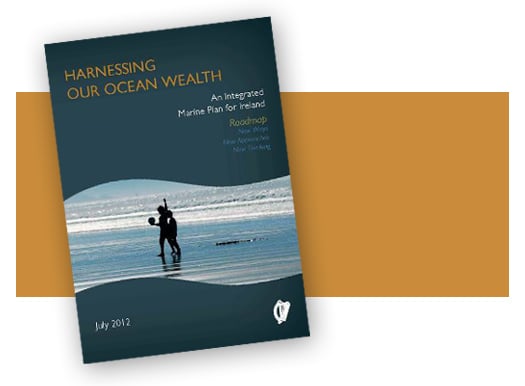
"For too long we have turned our backs on the sea. It's time now to look to our ocean as a national asset, to harness the opportunities for economic recovery. We need to treasure what we have and protect it for future generations. We also need to build on the potential of our ocean wealth and what it can give back to its people. 'Harnessing Our Ocean Wealth,' the title of this plan, puts a structure in place to make that happen".
That was the opinion expressed by Marine Minister Simon Coveney when he launched the national maritime development plan with the Taoiseach in Galway. It proposes that the value of Ireland's ocean wealth could be doubled to 2.4% of GDP and the turnover from our ocean economy be increased to more than €6.4bn by 2020.
It is a long-term outlook, but one to focus on, for seafood, fishing, marine tourism, shipping, oil and gas, renewable ocean energy and new applications for health, medicine and technology. It sets out goals to achieve a thriving maritime economy, healthy ecosystems and to increase the nation's engagement with the sea, focussing on the State creating the right conditions to promote investment and enable growth.
POOR OLYMPIC COVERAGE
I have had quite a few calls and Emails complaining about television coverage of sailing at the Olympics. It has been poor. TV coverage for the Games is provided by t Olympic Broadcast Services (OBS), an agency of the International Olympic Committee and prevents other broadcasters from covering the events. In sailing coverage has not been satisfactory and at times is done on a single camera which is not acceptable at this level of the sport. The IOC has treated sailing badly in television coverage. For a link to all the latest Irish Olympic sailing news click here.
• Email comments, opinions, information to: [email protected]
Follow more marine news and comment on Twitter: @TomMacSweeney
• And on Facebook – THIS ISLAND NATION
Fishing Industry Welcomes Selective Nets, Grant Aid at Irish Skipper Expo
#FISHING - Minister for the Marine Simon Coveney briefed the Irish Skipper Expo in Galway last weekend on a new initiative promoting the use of selective conservation fishing nets, which allow young fish to escape.
Under the initiative in the Celtic Sea, additional quotas of up to 25% will be made available by the minister to skippers of Irish fishing boats which use an escape panel in their nets, allowing young whiting and haddock to escape.
The escape panel, developed by the Irish industry, has been endorsed at EU level and is expected to be a mandatory requirement later in the year.
Minister Coveney said on Saturday: “The use of this panel will significantly reduce discards of juvenile whiting and haddock in the Celtic Sea, allowing juvenile fish to grow and mature and contribute to increased stock size and returns for fishermen in future years.
"I believe that this offers an example of a practical approach to dealing effectively with the discards problem and retention of a flexible quota allocation system that we should take forward in the context of the Common Fisheries Policy Review."
In other news, Bord Iascaigh Mhara (BIM) announced €1.5 million in grant aid for the Irish fishing industry at the expo.
A spokesperson for BIM confirmed to the Galway Independent that the funding will be available to industry through a variety of schemes including fleet safety, seafood environmental management, lobster V-notching and coastal action groups.
Over 100 companies displayed their products and services to fishermen at the Irish Skipper Expo International 2012, held at the Galway Bay Hotel on 24-25 February.
- Fishing
- commercial fishing
- Minister for the Marine
- Simon Coveney
- Irish Skipper Expo
- Skipper Expo International
- 2012
- Galway Bay Hotel
- Galway
- conservation
- selective
- quota
- Celtic sea
- initiative
- discards
- grant aid
- Bord Iascaigh Mhara
- BIM
- Funding
- Coastal
- Seafood
- whiting
- haddock
- juvenile fish
- Common Fisheries Policy
Licence Application for Aran Islands Fish Farm 'To Be Lodged in January'
#FISHING - The licence application for a proposed new deep-sea fish farm in the Aran Islands is expected to be lodged in January.
As previously reported on Afloat.ie, Bord Iascaigh Mhara's (BIM) planned 15,000-tonne organic salmon farm off Inis Oírr would be the largest of its kind in Europe, and would create hundreds of jobs in the area.
Commenting on the plans, Galway West Senator Fidelma Healy Eames said it was "a major opportunity for Galway and would represent a very significant economic boost for our coastal communities."
She added: "Deep sea fish farming has proven to be very economically beneficial in countries such as Norway, Chile and Scotland. It is timely that Ireland would capitalise on our fantastic marine resources as these countries have."
According to Healy Eames, the project is expected to "meet all environmental standards and will be barely visible from 2km away and effectively not visible from land.
"It would take up a negligible amount of inshore fisheries ground in the bay (0.22%) and would not interfere with existing fishing routes or Galway Bay ferry routes."
Europe's Largest Organic Fish Farm Proposed for Aran Islands
#FISHING - Bord Iascaigh Mhara (BIM) has begun the consultation process for a proposed new deep-sea fish farm in the Aran Islands, The Irish Times reports.
The 15,000-tonne organic salmon farm would be located off Inis Oírr on a 500-hectare site in Galway Bay, and would be one of the largest of its kind in Europe.
Approval of the project could see the creation of 350 direct and 150 indirect jobs, says BIM. It will be owned by the body on behalf of the State but leased to operators on a franchise basis.
The scheme has been welcomed by Comhar Caomhán Inis Oírr, but the island co-op said it was important that a promised €8-million pier for the island is constructed first to provide the necessary infrastructure.
The Irish Times has more on the story HERE.
Taoiseach Announces Marine Jobs On Visit of RV Celtic Explorer
An Taoiseach Enda Kenny visited the Marine Institute's research vessel RV Celtic Explorer in Dublin Port today, where he announced the creation of 92 jobs in the marine sector, writes Jehan Ashmore.
"Ireland is now recognised as an emerging power in Marine Research and Innovation," said the Taoiseach. Of the new positions, 64 will be generated in the seafood processing sector. This follows a €3.5m Seafood Processing Business Investment Scheme administered by Bord Iascaigh Mhara (BIM). In the area of marine research, 28 jobs have been created through funding of €2m from an International SmartOcean Graduate Programme.
SmartOcean is a collaboration between IRCSET (Irish Research Council for Science Engineering and Technology), the Marine Institute, five Irish universities and key multinationals and SME Information and Communication Technology (ICT) companies to provide funding for 28 research posts.
The Taoiseach said: "This has been achieved through the mapping of the 90% of Irish national territory that lies under the Atlantic, the creation of a quarter of a billion Euros worth of marine research infrastructure, and the fostering of strong linkages between industry and research centres, all of which will support employment opportunities in key areas of potential growth in the marine sector."
During the tour of the RV Celtic Explorer, the Taoiseach who was accompanied by Minister for Agriculture, Marine and Food, Simon Coveney, welcomed the expansion of Ireland's capabilities in the international shipping services sector, which is expected to attract additional jobs to the country.
Ireland's emerging international shipping services sector has continued to grow, underpinned by a number of investments in new and second hand ships over the last twelve months by such companies as Arklow Shipping and the Mainport Group, as well as foreign direct investments by D'Amico and Ardmore shipping.
As reported on Afloat.ie, RV Celtic Explorer had arrived yesterday into Dublin Port, having completed a fisheries demersal survey which started in Galway on 23 September. Initially she had docked at Ocean Pier but she subsequently shifted berths to Sir John Rogersons Quay for today's reception of An Taoiseach. According to her survey schedule she is due to depart tomorrow on a herring acoustic survey which is to take place in the Celtic Sea and off the south-west coast.
- Dublin Port
- BIM
- Marine Institute
- marine science
- Arklow Shipping Ltd
- Bord Iascaigh Mhara
- Ports and Shipping News
- Ardmore Shipping
- Mainport Group
- D'Amico
- Irish marine jobs
- An Taoiseach Enda Kenny
- SmartOcean
- RV Celtic Explorer
- RV Celtic Voyager
- Sir John Rogersons Quay
- Irish research vessels
- Simon Coveney
Fishermen Rewarded with Prestigious Marine Stewardship Certificates
Peter Whelan, Chairman of the Sea-Fisheries Protection Authority (SFPA), presented Gavin Power, Chairman of the Celtic Sea Herring Management Advisory Committee (CSHMAC) with the MSC Certification for Polyvalent Mackerel, today at the SFPA's Headquarters in Clonakilty, Co Cork.
Gavin Power of the Irish South and West Fish Producers' Organisation (IS&WFPO) and Chairman of the CSHMAC, said: "We are delighted to receive MSC Certification which is part of a structured approach towards improving the management and added value return from the polyvalent mackerel fishery. Importantly, this certification initiative represents the first such award for the Irish polyvalent sector and would not have been possible without the full support of the SFPA, the Marine Institute, the Department of Agriculture, Fisheries & Food and Bord Iascaigh Mhara.
MSC certification recognises sustainable practices in this important fishery, rewards robust governance, environmentally responsible and sustainable fishing practices and empowers consumers through the use of the label to make the best environmental choice."
Peter Whelan, Chairman of the SFPA said: "The CSHMAC's securing of the MSC's fishery certification program and seafood eco-label is significant as it recognises and rewards sustainable fishing and promotes the best environmental choice in seafood overall. Good governance and management frameworks safeguards jobs, secures fish stocks for the future and help to protect the marine environment. The MSC standard means sustainable fisheries can be recognised and rewarded in the marketplace and gives an assurance to buyers and consumers that their seafood comes from a well-managed and sustainable source."



























